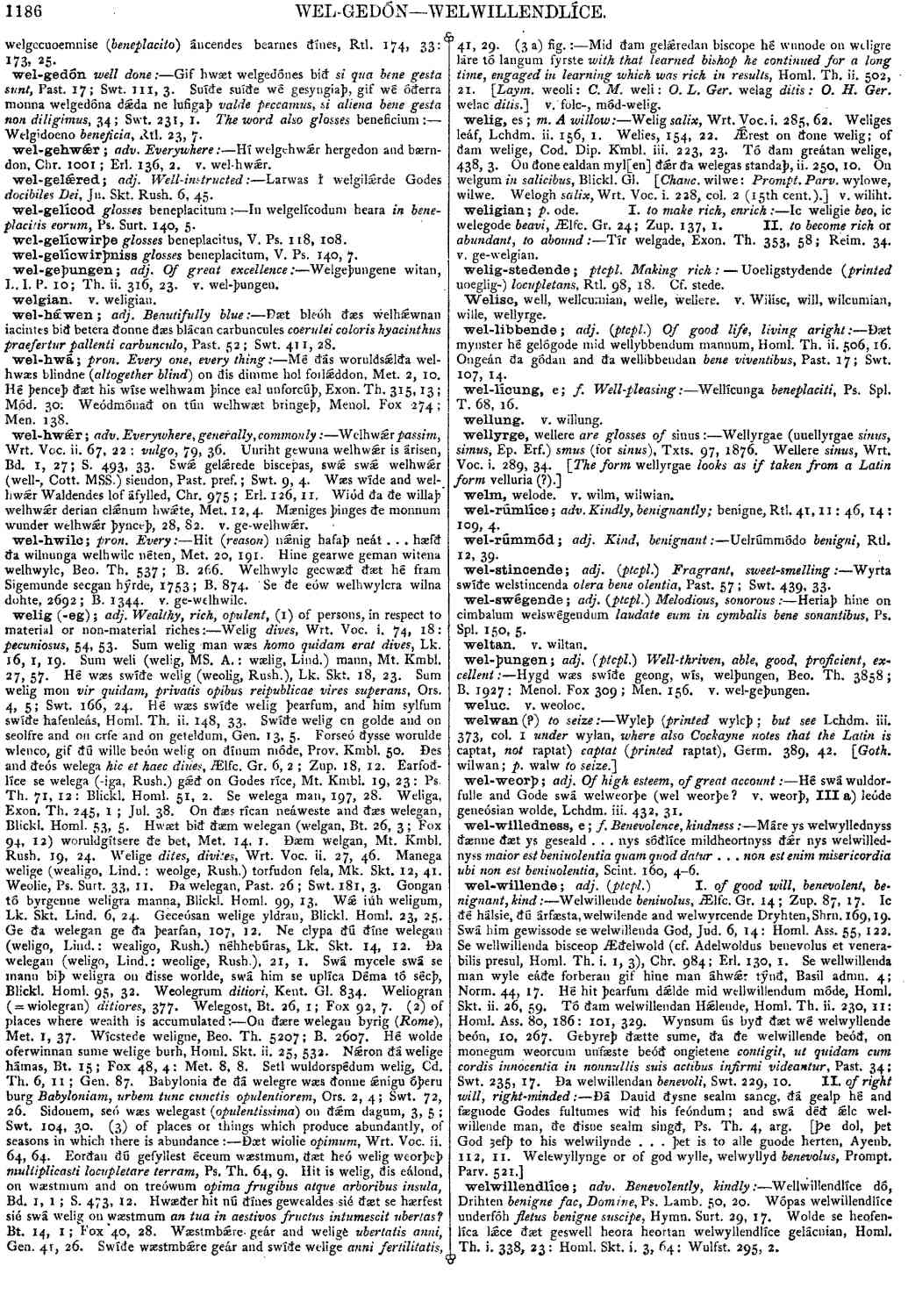welig
- adjective
-
Welig dives, Wrt. Voc. i. 74, 18:
pecuniosus,
- 54, 53.
-
Sum welig man wæs
homo quidam erat dives,
- Lk. 16, l, 19.
-
Sum weli (welig,
- MS. A.: wælig, Lind.) mann, Mt. Kmbl. 27, 57.
-
Hé wæs swíðe welig (weolig,
- Rush.), Lk. Skt. 18, 23.
-
Sum welig mon
vir quidam, privatis opibus reipublicae vires superans,
- Ors. 4, 5; Swt. 166, 24.
-
Hé wæs swíðe welig þearfum, and him sylfum swíðe hafenleás,
- Homl. Th. ii. 148, 33.
-
Swíðe welig on golde and on seolfre and on orfe and on geteldum,
- Gen. 13, 5.
-
Forseó ðysse worulde wlenco, gif ðú wille beón welig on ðínum móde,
- Prov. Kmbl. 50.
-
Ðes and ðeós welega
hic et haec diues,
- Ælfc. Gr. 6, 2; Zup. 18, 12.
-
Earfoð*-*líce se welega (-iga,
- Rush.)
-
Se welega man,
- 197, 28.
-
Weliga,
- Exon. Th. 245, 1; Jul. 38.
-
On ðæs rícan neáweste and ðæs welegan,
- Blickl. Homl. 53, 5.
-
Hwæt bið ðæm welegan (welgan,
- Bt. 26, 3; Fox 94, 12) woruldgítsere ðe bet, Met. 14, 1.
-
Ðæm welgan,
- Mt. Kmbl. Rush. 19, 24.
-
Welige
dites, divites,
- Wrt. Voc. ii. 27, 46.
-
Manega welige (wealigo,
- Lind.: weolge, Rush.) torfudon fela, Mk. Skt. 12, 41.
-
Weolie,
- Ps. Surt. 33, 11.
-
Ða welegan,
- Past. 26; Swt. 181, 3.
-
Gongan tó byrgenne weligra manna,
- Blickl. Homl. 99, 13.
-
Wǽ iúh weligum,
- Lk. Skt. Lind. 6, 24.
-
Geceósan welige yldran,
- Blickl. Homl. 23, 25.
-
Ge ða welegan ge ða þearfan,
- 107, 12.
-
Ne clypa ðú ðíne welegan (weligo,
- Lind.: wealigo, Rush.) néhhebúras, Lk. Skt. 14, 12.
-
Ða welegan (weligo,
- Lind.: weolige, Rush.), 21, 1.
-
Swá mycele swá se mann biþ weligra on ðisse worlde, swá him se uplíca Déma tó sécþ,
- Blickl. Homl. 95, 32.
-
Weolegrum
ditiori,
- Kent. Gl. 834.
-
Weliogran ( = wiolegran)
ditiores,
377. -
Welegost,
- Bt. 26, 1; Fox 92, 7.
-
On ðære welegan byrig (
Rome
),- Met. 1, 37.
-
Wícstede weligne,
- Beo. Th. 5207; B. 2607.
-
Hé wolde oferwinnan sume welige burh,
- Homl. Skt. ii. 25, 532.
-
Nǽron ðá welige hámas,
- Bt. 15; Fox 48, 4: Met. 8, 8.
-
Setl wuldorspédum welig,
- Cd. Th. 6, 11; Gen. 87.
-
Babylonia ðe ðá welegre wæs ðonne ǽnigu óþeru burg
Babyloniam, urbem tunc cunctis opulentiorem,
- Ors. 2, 4; Swt. 72, 26.
-
Sidonem, seó wæs welegast (
opulentissima
) on ðǽm dagum,- 3, 5: Swt. 104, 30.
-
Ðæt wiolie
opimum,
- Wrt. Voc. ii. 64, 64.
-
Eorðan ðú gefyllest éceum wæstmum, ðæt heó welig weorþeþ
multiplicasti locupletare terram,
- Ps. Th. 64, 9.
-
Hit is welig, ðis eálond, on wæstmum and on treówum
opima frugibus atque arboribus insula,
- Bd. 1, 1; S. 473, 12.
-
Hwæðer hit nú ðínes gewealdes sié ðæt se hærfest sié swá welig on wæstmum
an tua in aestivos fructus intumescit ubertas?
- Bt. 14, 1; Fox 40, 28.
-
Wæstmbǽre geár and welígé
ubertatis anni,
- Gen. 41, 26.
-
Swíðe wæstmbǽre geár and swíðe welige anni fertilitatis, 41, 29. (3 a) fig. :-- Mid ðam gelǽredan biscope hé wunode on weligre láre tó langum fyrste
with that learned bishop he continued for a long time, engaged in learning which was rich in results,
- Homl. Th. ii. 502, 21.
Bosworth, Joseph. “welig.” In An Anglo-Saxon Dictionary Online, edited by Thomas Northcote Toller, Christ Sean, and Ondřej Tichy. Prague: Faculty of Arts, Charles University, 2014. https://bosworthtoller.com/35019.
Checked: 0